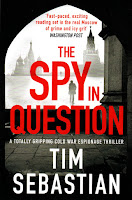I often wander in to Oxfam and The Works in Derby and usually come out with yet more material for my ever-expanding 'library'. The latter has a '3 for £5' sticker on many of its paperbacks, which acts as a fly sticky trap for me. On my last visit, I bought three Tim Sebastian Spy novels and have just finished the last one - it made a change from early nineteenth-century Scottish novels. The blurbs of the backs were slightly different from each other: A taut Cold War thriller...perfect for fans of John le Carré and Frederick Forsyth; An espionage thriller packed with intrigue and suspense, perfect for fans of Alistair MacLean and Len Deighton; A tense espionage thriller with a terrifying dose of reality, ideal for readers of John le Carré and Eric Ambler. Well, I have read several Frederick Forsyth and Alistair MacLean thrillers and was weaned on those of Helen MacInnes (see earlier Blogs) and much prefer spy thrillers to detective stories (and I loathe SciFi !). Did Sebastian's work measure up to the adulation?
1988 1990 1991
Tim Sebastian is a former BBC correspondent (and spy?!) in Moscow, Washington and Warsaw. Now 70, he has had over 40 years' experience of international affairs - both official and 'unofficial'. He began his journalism career at Reuters in 1974, and moved to the BBC in 1979 as foreign correspondent in Warsaw. He became the corporation's Europe correspondent in 1982, for Moscow in 1984 (until his expulsion from the USSR in 1985) and then for Washington between 1986 and 1989. He speaks Russian and German. He, therefore, 'knows his onions'.
Between 1974 and 1989, the USSR had four leaders or General Secretaries - Brezhnev (to 1982); Andropov (1982-1984); Chernenko (1984-1985) and Gorbachev (1985-1991). The latter survived what became known as the August coup in 1991, but essentially ceded power to Boris Yeltsin and resigned not long after. Hence, Sebastian was at the forefront of the existential power struggle going on in Russia and its satellites during those years. The stories are very much of their time - rather like MacInnes and the 1950s-1980s - (or 'were' - since the back-street thug and KGB criminal, Vladimir Putin, established his grip on power, the atmosphere described is horribly relevant. When he first levered his way to the top, he was comparatively young, like Gorbachev, but, at 70, he appears to be an old, sick man in a hurry).
The Spy in Question tells the story of Dmitry Kalyagin, who has just gained a seat in the powerful Politburo. It is a triumph for both himself and the British secret service - he has been a 'mole' for them for two decades. Unfortunately, it is increasingly obvious that his cover is likely to be blown. There is another 'mole', high up in the British Embassy in Moscow. The twists and turns that lead to the denouement on the steps of the latter ensure the story is not only redolent of the period, but told in an increasingly spell-bindingly way. I think it tips the other two novels to first place.
Spy Shadow details a increasingly lone, and lonely, attempt by an ageing English spy, soft of body but sharp of mind, James Tristram, to disentangle the motives behind his being detailed to Poland (Warsaw) to aid an uprising against the Polish government. He realises that the real plot is led by Russian hardliners, aiming to discredit the Gorbachev regime back in Moscow. Worse, it is obvious there is a long-placed 'mole' in the British secret service. It ends in Geneva, where the 'mole' gets his just deserts. But everything has been so 'seedy' and demoralising, even for this reader! (knowing what has occurred since 1999).
Saviour's Gate brings a little more romance, but the usual treachery and double-dealing, to a rather convoluted plot. This involves not only the Russians and British, but the Americans as well. One feels no one can be trusted. Published in the same year as Gorbachev's real-life troubles and eventual demise, it again hits the mark when describing the febrile atmosphere both inside and around the Kremlin. I sometimes lost track as to who was doing what to whom, and it occasionally became a little too convoluted, but the characters were quite well drawn and believable.. Three sentences summed up the self-serving at the heart of the USSR regime: Once they became sure the General Secretary was on his way out, they'd be the first to turn on him, to stab him in the chest. It was simply the Soviet way. None of them would give it a second thought. Perhaps Gorbachev should have invested in an ultra-long table, like Putin's.



No comments:
Post a Comment